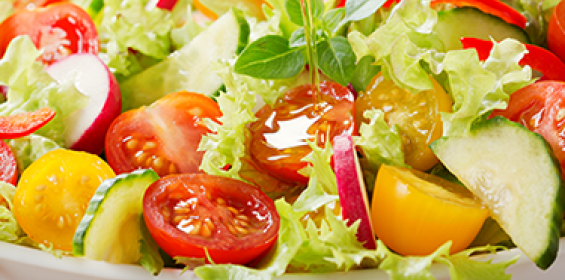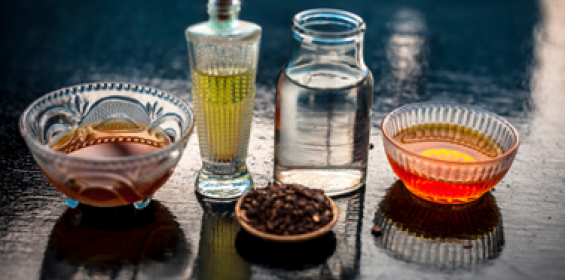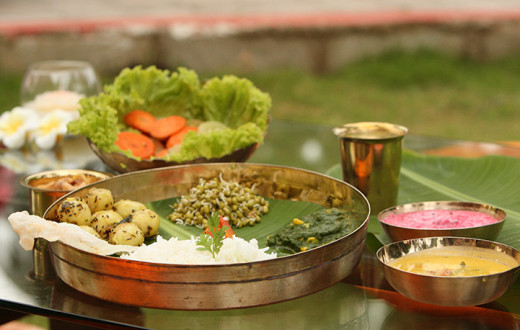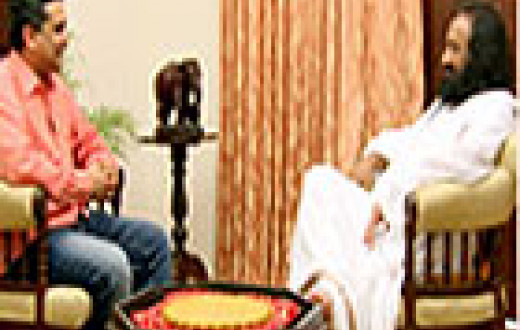The mirage of an explosion of stars in the multihued sky, the ear-splitting sounds of celebration renting through the air, the auspicious scents of poojas, the glitter and dazzle of finery all around you not to mention the rich aromas of sweets and snacks wafting through every home. It is little wonder that Diwali is everyone’s favorite festival. The sights and sounds fill and thrill our hearts and minds especially in a year that has been rather insipid and cheerless. This spectacle of light and sound has been the very tonic that we have all been longing for. However, the after-effects are not quite so wholesome.

Acid reflux, stomach upsets, weak digestive systems, clogged lungs, flatulence, heaviness, bloatedness, anyone? Naturally, at the end of the festivities, our bodies and minds react to the indiscriminate overeating, the raised decibels, and the smog. We are also left with a longing for silence after all the activity of the festival period. In short, as much fun as Diwali is, we feel the need for a full detox program for our body and mind at the end of it.
Part of the problem is seasonal as post Diwali, we experience dry weather in the fall season, Sharad Ritu, which results in cracked heels, stiffness in muscles and joints, and dehydration. Fortunately, Ayurveda has an elaborate list of seasonal guidelines in place to help you. The Ritucharya (Ritu - season, charya - guidelines) can help you reconnect with nature and put you on the track of detoxification and good health.
Ayurveda says there are three types of body constitutions - Vata, Pitta, and Kapha. This time of year is called Pitta Prakopakala in Ayurveda, which means that Pitta (fire and water element in the body) is vitiated around this time. This leads to more digestive problems for those with Pitta constitution.
Ideally, detoxification is done during navratri. And the post Diwali period is usually the time to nourish and rejuvenate the system. However, those who missed out on this can benefit from these detox guidelines.
Let’s take a look at what foods are suggested by Ayurveda to detoxify you once Diwali is over.
How to detox your body post Diwali
1. Liquids to aid digestion
Hydrate yourself well to regularly flush out toxins from the body. While there is no substitute for drinking water, here are a few other fluid suggestions that can help you detoxify.
- Start your day with a glass of warm water with lemon in it. Lemon aids in activating the digestive tract as the acid in it helps in breaking up food and speeding up digestion. It pushes the liver to produce bile which helps digest food easily.
- Warm water at the start of the day also helps you flush out toxins and hence cleanses your insides. According to Ayurveda, twice boiled water has an energy in it; sip this water all day long.
- Green tea is rich in antioxidants. It also helps the liver with digestion. The rich foods we eat during Diwali deplete the body of water content. Green tea hydrates the body, countering this effect. It also helps in burning fats as it increases the metabolic rate of the body.
- Vegetable soup counters the oily feeling you have within. It is filled with nutrition, rich in antioxidants and potassium, and provides an alkaline atmosphere that helps flush out toxins. If you are feeling heavy after binging on the rich festive goodies, you can take your soup light rather than thick. It also keeps you feeling full and satisfied.

2. Fruits to juice up your insides
In almost every season and time, multiple, daily helpings of colorful fruits find their way into the list of must-eats - for their multivitamins, antioxidants, minerals, and fibers. However, after the rich intake of Diwali snacks and sweets, your tongue and entire system will appreciate the fresh, tangy, and wholesome taste of fruits. Our overindulgences during Diwali lead to a build-up of toxins along the intestinal walls which prevents the absorption of nutrients in the body. The fiber in fruits cleanses these toxins, aiding effective digestion.
- You can add papaya, pomegranate, and other seasonal fruits to your Diwali detox diet.
- Apples and pears are rich in antioxidants and their juicy taste will help counter the greasy aftertaste of Diwali snacks.
- Generously choose from these other fruits to embellish your diet - berries, grapefruit, kiwi, guava, lime, melon, oranges, grapes, pineapple, pomegranate, strawberries, watermelon, and any other that suits your tongue and palate.
3. Soaked nuts and dry fruits
You can consume a handful of soaked nuts and dry fruits to help detoxify yourself after your Diwali feast.
- They are packed with proteins and vitamins (especially Vitamin B) and can rejuvenate the tired body.
- They can break down gluten from carbohydrates, helping smooth the process of digestion.
- They cleanse the system by neutralizing the toxins in the colon.
4. Boiled sprouts to flush toxins out
Sprouts have multiple benefits for the body, skin, and hair. To make it easier to digest, you can steam them.
- They boost immunity and aid in blood purification.
- The antioxidants in them prevent damage to tissues.
- The omega-3 fats give your hair and skin a glow.
- Sprouts are also suggested for women dealing with hormonal imbalances.
- They also hydrate the body, ensuring that the sugar and fats we consume during Diwali don’t leave our body dehydrated.
5. Light food to ease the heavy, bloated feeling
After gorging all those mouthwatering delicacies that are inevitably soaked in sugar or oil, you are left craving for some light food that will go easy on your digestive system and palate. Khichdi, quinoa, and porridge are three gluten-free alternatives that do not tax the digestive system, making them ideal for a detox. They are nourishing, nutritious, energizing, and filling. To top it all, they also strengthen the immune system.
6. Probiotics to settle the stomach
The indiscriminate bingeing can weaken the digestive system. Buttermilk would be a good addition to help your stomach settle down. You can also occasionally include yogurts and curd. The good bacteria in the probiotics can help the intestines process food more easily. It also helps get rid of the seemingly unending thirst that oily food induces.
7. Vit D when the sun does not shine
The end of Diwali signifies the end of those warm, sunny days and consequently, the level of Vitamin D in the body also dips. It would be a good idea to take some Vitamin D3 supplements to amplify your diet’s nutritional value.
What foodstuff to avoid post Diwali
- Avoid fried, cheesy, and baked food. You might not feel like it post binging anyway!

- Avoid processed foods high in salt and sugar.
- While vegetables are a good addition to the diet, some like cabbage, cauliflower, chickpeas, and radish can cause bloating.
- Avoid green, leafy vegetables at night.
Now that you have some remedies to help you cleanse your inner system, try these Ayurvedic treatments to give yourself an outer glow.
Ayurvedic treatments to help detoxify post Diwali
1. Abhyanga
The activities of the Diwali week leave you physically tired. The deafening sounds of crackers and the accompanying pollution and smog will also leave your skin dry and listless. At such a time, a full body oil massage is just what the doctor ordered. Abhyanga is a warm oil massage from the scalp to the soles that can greatly rejuvenate you - the best skin care treatment at this time. Regular oil baths can improve skin tone and texture, keeping it smooth and hydrated.
In particular, abhyanga nourishes and stimulates your inner and outer organs. The oil seeps into the tissues of the body, giving your skin that beautiful glow and your inner organs that much-needed massage. Just the pampering you need during and after Diwali!
2. Ksheerabala oil for massaging
This season also sees vata (air element) imbalances. Children tend to feel pain in the bones, muscles, and joints in this season. You can use Ksheerabala Taila to massage their limbs. This will reduce vata imbalance.
Tips for children to detoxify post Diwali
1. Detoxifying the system
Children can drink half a cup of warm milk with 1 teaspoon of castor oil before bedtime to cleanse their stomach and liver and flush out toxins from their abdomen.

2. Deworming
Add 1-2 grams of turmeric powder to 5-6 neem leaves and make a paste of it. Children can ingest a quarter spoon of this paste with warm water in the morning. This can be done once in six months to help children deworm, an important cleansing activity especially at this time of year.
3. Immunity-building juice
A daily concoction of gooseberry, tulsi, pepper, and lemon will build the immunity of your children and the whole family.
From pollution to pure air
As much as we enjoy the light and sound of crackers, many people experience congestion and clogging of the respiratory tract during Diwali. Air pollution peaks post Diwali, making it difficult for people to breathe. At this time, it would be a good idea to try to find parks and playgrounds amidst nature and detoxify by breathing in clean air. Get in shape inside out with exercise.
1. Physical exercise
Most of us only exercise our jaws and digestive system during Diwali! If you took off from your regular exercise regimen during the festivities, slowly restart your workouts. Warm up well, and begin with short sessions before you go back to your pre-festival levels. Children could play sports like badminton and tennis to regain their fitness. Yoga is also a good exercise for kids and adults alike. Doing it in the open air will ensure that you get fresh oxygen, which will help clear up your clogged lungs.
2. Breathing exercises
To help free your air passageways post Diwali, you can start with some pranayamas like Kapalbhati pranayama, Bhramari pranayama, and Nadi Shodhana pranayama. These will clear your breathing tract and improve the functioning of your digestive system.
Another breathing technique, the Sudarshan Kriya, can also promote all round wellbeing by keeping your breathing rhythm aligned with nature. Follow this up with meditation to get an overall sense of peace and calm and your detox will be complete!
For the perfect mix of yoga, pranayama, meditation as well as the Sudarshan Kriya, you can join the Online Meditation & Breath Workshop here.
Based on inputs from Gaurav Verma, Regional Director, Sri Sri Yoga, Kaushani Desai, Ayurveda Cooking Expert, Dr. Mitali Madhusmita, Ayurveda expert and senior doctor at Sri Sri Tattva Panchakarma, and Dr. Sharika Menon, Ayurvaidya, Sri Sri Tattva.




































